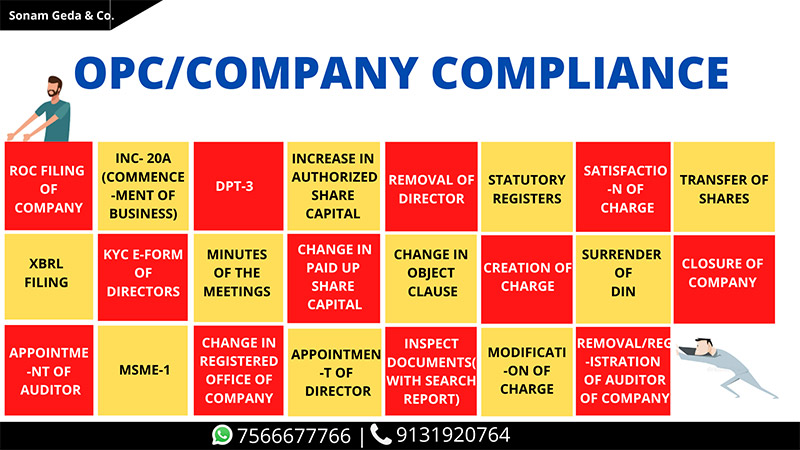Creation of Charge
Overview
Charge is a right created by the company as a ‘borrower’ on its assets or properties as security against loan in favour of Bank/ Financial Institution (FI) which lends money to the company.


NEED FOR CREATING CHARGE
Every company requires funds for its operation which can be raised by issuing equity or debt instruments or by advancing loan from Bank or FI. In case company opts for raising funds through loan then it approach to bank/FI for the same. Banks/FI does not lend money unless they are sure that their funds are safe and be repaid. So, for the purpose of providing security for loans company needs to create charge on its assets or properties.
CONDITIONS OF CHARGE FOR REGISTRATION
As per the Companies Act, 2013 every company is required to register charges created by it on its assets or properties. Following charges should be registered by the company:
- Charge created on the property or assets or any other undertaking of the company.
- Charge created within or outside India.
- Charge either created on tangible or intangible property.
- Charge created on the property or assets either situated in or outside India.


MINIMUM REQUIREMENTS OF CHARGE
Charge should have following essential features:
- There should be two parties, one the creator of charge and the other is charge holder.
- The intension of borrower to offer its properties as security against loan.
- The subject matter of charge i.e. assets or properties.
TIME LIMIT FOR REGISTRATION CHARGE
The charge modified by the company should be registered within 30 days of modification with the ROC. In case company fails to register within 30 days than it is required to make an application to:
- Registrar for extension of time in form CHG-1 along with the additional fees. The Registrar can extend time for not more than 300 days from the date of modification of charge. If company fails to register modification within 300 days than Registrar may allow to register modification within 6 months from the date of commencement of Companies (Amendment) Act, 2019. ( In case charges is created/modified before the commencement of Companies (Amendment) Act, 2019)
- Registrar for extension of time in form CHG-1 along with the additional fees. The Registrar can extend time for not more than 60 days from the date of modification of charge. If company fails to register modification within 60 days than Registrar may allow further period of 60 days after payment of fees. ( In case charges is created/modified on or after the commencement of Companies (Amendment) Act, 2019)


WHO CAN MAKE APPLICATION FOR REGISTRATION OF CHARGE
Application for registration of charge can be made by:
- Creator of charge which means company.
- Charge holder, if company fails to make an application.
PROCEDURE FOR CREATION AND REGISTRATION OF CHARGE
- STEP-1: Convene Board Meeting:- Board meeting of the company should be conducted after giving notice to the Board of Director to pass resolution for:
• Considering decision for modifying terms and conditions of charge.
• Authorising person to execute documents and filing application with registrar for registration of charge.
In case section 180(3)(c) of Companies Act, 2013 is applicable for borrowing funds by the company than company is required to pass special resolution in general meeting for authorising board to borrow funds. - STEP-2: Where special resolution is passed as required u/s 180 of the Companies Act, 2013, form MGT-14 to be filed with the Registrar within 30 days of passing resolution along with the copy of special resolution.
- STEP-3: Execute various documents for availing loan and instrument evidencing creation of charge by the company with the Bank/ FI.
- STEP-4: Application for registration of charge:-Company is required to make an application for registration of charge within 30 days of creation of charge in form CHG-1 (for other than debenture) or in form CHG-9 (for debentures) with the ROC. The particulars of charge filed in form CHG-1 or CHG-9 shall be filed along with the prescribed fees and documents required shall be attached with this form.
- STEP-5: Application for condonation of delay:- If company fails to register charge within 30 days of its creation than it should apply ROC for the purpose of condonation of delay beyond 30 days in form CHG-1. The registrar on being satisfied may allow the company for registration of charge within 300 or 60 days of creation of charge as the case may be on payment of additional fees.
- STEP-6: Issue of certificate of Registration of Charge:- Where a charge is registered by registrar, it will issue Certificate of Registration of charge in form CHG-2 to the company and charge holder.


WHAT PARTICULARS OF CHARGES SHOULD BE FILED?
The following particulars of charge should be filed with the Registrar:
- Total amount secured by the charge.
- Date and details of instrument creating charge.
- Name and address of charge holder.
- General description of the property charged.
- Date of resolution authorising creation of charge.
- Terms and conditions of the loan.
ATTACHMENTS OF FORM CHG-1
- Instrument of creation or modification of charge.
- If company is acquiring property subject to charge than instrument evidencing creation of charge and acquisition of such property.
- If company has undertaken consortium finance than Particulars of all joint charge holders.
- Any other information can be provided as an optional attachment(s).


E-FORMS FOR REGISTRATION OF CHARGE
Following forms are required for registration of charge:
- CHG-1- Application by company for registration of charge.
- CHG-2- Issue of Certificate of Registration of charge by Registrar.
- CHG-9- Application for registration of charge by company in case of Debentures.
CONSEQUENCES OF NON-REGISTRATION OF CHARGE
If company does not register charge created by it then:
- 1. At the time of winding up of company the liquidator will treat the assets or properties of the company as free of charge and concerned creditor as unsecured creditor.
- 2. Any subsequent charge is created on the same property and the latter charge if registered would enjoy priority that means latter charge holder can sell property in order to recover its money.


GOVERNMENT FEES
The fees for filing Form CHG-1 with the registrar of companies are:
| S.No | Share Capital Value of the Company | Fee (in Rupees) |
|---|---|---|
| 1 | Less than 1,00,000 | Rupees 200 |
| 2 | 1,00,000 to 4,99,999 | Rupees 300 |
| 3 | 5,00,000 to 24,99,999 | Rupees 400 |
| 4 | 25,00,000 to 99,99,999 | Rupees 500 |
| 5 | 1,00,00,000 or more | Rupees 600 |
• In case of Indian company not having share capital- Rs. 200
• In case of foreign company- Rs. 6,000
| S.No | Delay in Filing (No of days) | Penalty |
|---|---|---|
| 1 | Upto 30 | 2 times of Normal Fees |
| 2 | More than 30 to 60 | 4 times of Normal Fees |
| 3 | More than 60 to 90 | 6 times of Normal Fees |
| 4 | More than 90 to 180 | 10 times of Normal Fees |
| 5 | More than 180 | 12 times of Normal Fees |

Subscribe Our Newsletter
Get useful latest news & other important update on your email.





